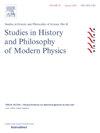解释宇宙无毛定理:关于宇宙模型扩展的遥远未来的宿命论是否不可避免?
Q1 Arts and Humanities
Studies in History and Philosophy of Modern Physics
Pub Date : 2019-05-01
DOI:10.1016/j.shpsb.2019.02.003
引用次数: 1
摘要
将宇宙无毛定理(在特定条件下,宇宙模型在未来加速膨胀接近德西特度量)解释为暗示宇宙未来状态的一种宿命论可能很诱人。在这篇文章中,我将探讨(相当普遍的)哲学和(更具体的)物理原因来抵制这种诱惑。有充分的理由认为(即使是局部的)扩展的宇宙模型的未来可能与德西特不同。本文章由计算机程序翻译,如有差异,请以英文原文为准。
Interpreting cosmic no hair theorems: Is fatalism about the far future of expanding cosmological models unavoidable?
It may be tempting to interpret cosmic no hair theorems (establishing that, under certain conditions, a cosmological model with accelerating expansion approaches de Sitter metric in the future) as implying a form of fatalism about a future state of the universe. In this note I explore (rather general) philosophical and (more concrete) physical reasons to resist such temptation. There are good reasons to think that (even locally) futures of expanding cosmological models may be unlike de Sitter.
求助全文
通过发布文献求助,成功后即可免费获取论文全文。
去求助
来源期刊
自引率
0.00%
发文量
0
审稿时长
13.3 weeks
期刊介绍:
Studies in History and Philosophy of Modern Physics is devoted to all aspects of the history and philosophy of modern physics broadly understood, including physical aspects of astronomy, chemistry and other non-biological sciences. The primary focus is on physics from the mid/late-nineteenth century to the present, the period of emergence of the kind of theoretical physics that has come to dominate the exact sciences in the twentieth century. The journal is internationally oriented with contributions from a wide range of perspectives. In addition to purely historical or philosophical papers, the editors particularly encourage papers that combine these two disciplines.
The editors are also keen to publish papers of interest to physicists, as well as specialists in history and philosophy of physics.

 求助内容:
求助内容: 应助结果提醒方式:
应助结果提醒方式:


